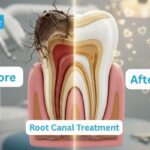Dental bridges are a trusted solution because they replace missing teeth, restore your smile, and protect your oral health. Since you may wonder, it’s natural to wonder how long a dental bridge will last if you’re considering one for the first time and how to maximize your investment.
This is a guide that explains the lifespan and types of dental bridges. It also covers proper care to ensure your bridge stays strong and functional.
Understanding Dental Bridges
A dental bridge fills in the space caused by a missing tooth or teeth. Artificial teeth, or pontics, anchored in their place are composed of either one crown or more crowns attached to abutment teeth. Bridges keep teeth from moving, maintain your shape, improve chewing and speaking, and restore your smile. Dental Bridges
Dental bridges’ lifespans vary. The different kinds of dental bridges affect it. A decision that is informed results from a comprehension of your options.
1. Traditional Bridges
This type is the most common one. Bridges customarily involve a pontic between the crowns for the teeth on each side of the missing tooth. If cared for properly, these bridges can last many years and are durable.
2. Cantilever Bridge
A cantilever bridge is used when adjacent teeth exist on one side of a missing tooth. In some instances, cantilever bridges can be helpful. However, they place even more stress upon the supporting tooth, reducing their lifespan compared to customary bridges.
3. Maryland Bonded Bridges
Also called resin-bonded bridges, metal and porcelain wings are used for each pontic side and bonded to the back of adjacent teeth. Though less intrusive, Maryland bridges may not last as long under heavy biting pressure.
4. Implant-Supported Bridges
Dental implants act like anchors for implant-supported bridges instead of natural teeth. These bridges offer great strength plus stability because implants integrate well with the jawbone for optimal lifespan.
How long do Dental Bridges Typically Last?
Dental bridges last from 5 to 15 years on average. They can last for even longer with some good care. Patients keep some bridges for over 20 years. Lifespan hinges on several factors, such as bridge type, oral hygiene, diet, and protecting teeth from damage.
Factors That Affect the Lifespan of Dental Bridges
1. Oral Hygiene
Decay and gum disease can weaken the supporting teeth. To help prevent them, brush two times daily, floss under the bridge, and use an antibacterial mouthwash.
2. Regular Dental Visit
You can catch bridge problems or teeth issues early through regular dental checkups. Routine professional cleanings can prove helpful. Your bridge receives care from them.
3. Quality of Materials
Due to good materials, zirconia or porcelain fused to metal bridges seem more natural and often last longer.
4. Lifestyle and Diet
Tough foods, sticky sweets, or behaviors such as using teeth to open things and chewing ice can harm your bridge. Smoking can affect bridge longevity risk, with gum disease increased.
5. Teeth Grinding
Bruxism, or teeth grinding, can place stress on a dental bridge. If you grind your teeth, your dentist might recommend a custom night guard for your bridge and natural teeth.
Signs Your Dental Bridge Needs Attention
- Knowing when a repair is needed on a bridge prevents bigger problems. Knowing when it needs replacement also helps out.
- Loose or shifting bridge
- Discomfort or pain around the bridge area
- Difficulty chewing
- Visible damage or cracks
- Gingival inflammation or recession at the bridge
- You should promptly see your dentist to avoid further damage if you notice these issues.
Tips to Make Your Dental Bridge Last Longer
- Maintain Excellent Oral Hygiene
- Clean your teeth twice a day with fluoride toothpaste and a soft-bristled toothbrush. Use floss threaders or interdental brushes daily to floss around and under your bridge.
- Avoid Damaging Food and Harbor
- Avoid nail-biting or chewing on pens, and limit sticky or hard foods. To protect your bridge, treat it as you would treat your natural teeth.
- Use a Mouthguard if Needed
- If you play contact sports, wear a mouthguard to protect your teeth and prevent injury. A night guard is, in fact, a wise investment. You might think of one if you grind your teeth during the night.
- Keep Up With Dental Checkups
- Regular exams and cleanings catch potential problems early, saving money and discomfort.
The Replacement Process
Even with great care, bridges may eventually need replacement. Bridge replacement typically involves removing the old bridge, treating abutment teeth issues, and fitting a new custom-made bridge. Because of dental technology, replacement bridges look more natural and are stronger than they were.
Are Dental Bridges Worth It?
Many patients find dental bridges a reliable, cost-effective solution for missing teeth. They restore confidence, improve chewing and speaking, and protect the alignment of the remaining teeth. While they require care and may eventually need replacing, the benefits make them a good investment for many people.
Conclusion
In conclusion, dental bridges last many years and require proper attention and care. Understanding the factors of bridge lifespan helps first-time patients make the best choices for oral health. Maintain regular dental appointments and practice outstanding hygiene while avoiding harmful habits to protect your investment and enjoy a confident, complete smile.





